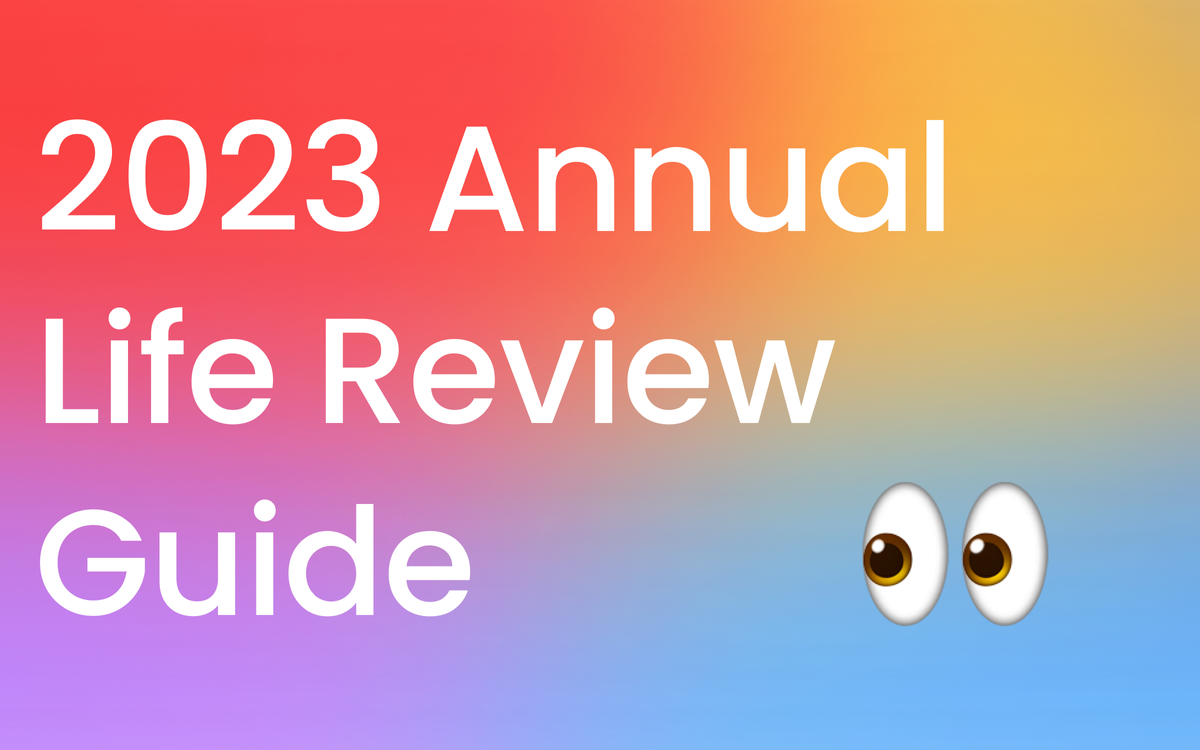Annual Life Review Guide
the ultimate guide to doing an end of the year annual life review

This is a guide for anyone interested in doing an end of the year annual life review. If you do an annual life review and are looking for support on achieving your biggest goals out of it, please give Summit a try: Summit is your personal AI life coach that makes it easy to organize and track your biggest goals and make meaningful progress on them throughout the year.
- What is an annual life review?
- Why do an annual life review?
- General tips for doing an annual life review
- Popular annual life review methods
- Tim Ferris
- Alex Vermeer
- Steve Schlafman
- Year Compass
- Ok you’ve done your annual review, now what?
- Summary
What is an Annual life review?
Broadly, an annual life review is a process by which you examine all areas of your life from the past 12 months with the goal of retrospective what is working well, what is not working well, and generally helping you figure out what you want to double down on our change in the coming year.
Typically life reviews consist of exercises to help you look back at the past and to look towards the future for example:
- a calendar/time audit (e.g. what were the major events that happened for you in the last year)
- general reflection questions (e.g. what made you happy in the last year? what were your biggest accomplishments?)
- a wheel-of-life type of exercise where you rate 1-10 satisfaction scores the key areas in your life (e.g. career, friends, family, health, etc.)
- future projecting reflection questions (e.g. what is something you want to accomplish next year?)
Typically an annual life review will end in coming up with actionable steps or goals that you can take out of the review and put into action to start the new year.
Why do an Annual life review?
Don’t take it from our random blog post, take it from others:
General tips for doing an Annual life review
- Take the time: doing an annual life review in depth can take a lot of time and honestly be pretty mentally exhausting. Depending on the review that you do, you might consider breaking it up over several days or even weeks.
- Mix your space up: reflecting is an opportunity to get out of ruts and open up your mind, consider changing your space and going to a coffee shop or even if you are able to, go to a new location and take a dedicated trip and time to reflect.
- Make it your own: don’t feel that you need to follow any of these reviews by the book. Pay attention to what resonates, skip what drags, and ultimately follow your curiosity in terms of how you do your review.
Popular Annual Life Review Methods
- Tim Ferris: Past year review
Time required: 1-2 hours
Links: https://tim.blog/2021/12/27/past-year-review/
Tim’s past year review is a nice pretty nice and concise way to do an annual life review. It consists of a time audit and then reflecting on what areas took away and gave energy. If you want to get a “biggest bang for the time buck” review, would recommend doing this one and sprinkling in some reflection questions as well for some additional introspection help.
- Alex Vermeer: 8,760 Hours
Time required: 4-8 hours
Links: https://alexvermeer.com/8760hours/
Alex’s 8,760 hours guide is one of the originals and actually the first guide I was pointed to when I first started doing annual reviews. The guide is a bit free flowing and recommend that you pick and choose the different questions and areas that resonate most with you. I’ve found Alex’s to be quite reflective and use a modified version of it to do my own reviews. I would recommend Alex’s if you want a little less structure and want to do a more choose-your-own type of review.
- Steve Schlafman: Ultimate Annual Life Review
Time required: 4 - 8 hours+
Links: https://www.annualreview.life/
Steve’s is a nice middle ground in between Tim’s and Alex’s. The structure of it is really nice and incorporates some nice reflection questions, some life area assessments and future facing assessments. I would recommend Steve’s guide if you don’t care as much about personalizing a review and want a good structure that results in a good outcome.
- Year Compass
Time required: a few hours
Links: https://yearcompass.com/
If you want a more physical version of an annual review - Year Compass could be a nice choice. You can order physical booklets or download one of the templates. Content-wise, Year Compass has some similar exercises to others mentioned here. We do really like the future facing reflection questions that it has.
- Summit: Wheel of Life
Time required: < 1 hour
Links: www.summit.im/wheel
At Summit, we’ve started by providing some smaller end of year reflection type of tools such as a wheel of life and a special “end of year” reflection mode to talk to your coach. These are not meant to be as robust as some of the other methodologies above, but are still useful if you want to make some progress with a reflection. Summit’s power really comes in making your big goals for next year actionable and keeping them top of mind for you throughout the year.
Ok you’ve done your annual review, now what?
Hopefully you’re feeling excited and honestly, probably a bit exhausting. Would recommend after doing your annual review, take a break! Give it some time to simmer, and revisit it after a few days. Once you’ve done this, would highly recommend figuring out what systems you can put into place to actually make your next year goals or intentions more likely to happen.
Some recommendations
- Setup some calendar events as a reminder to revisit your annual review and year goals, once every couple of months would be a good cadence
- Figure out a system to track your biggest goals, whether a document that you can reliably revisit or a product like Summit that helps you organize your goals and stay on top of them more frequently
- Share what you’ve uncovered with those close to you. If you’re comfortable, you’ve learned a lot about yourself and have found that when we share some (doesn’t need to be all) reflections with those close to us, it helps others help hold us accountable and general understand and support as we are investing in our self-mastery journey
Summary
We hope that this blog post helps you find an annual review process that works! By doing an annual review, you’re investing in yourself and regardless of what method you use, hope that you appreciate and are grateful for yourself taking the time to make yourself better. If we missed any guides or if you have any thoughts, we’d love to hear from you: alex@summit.im




